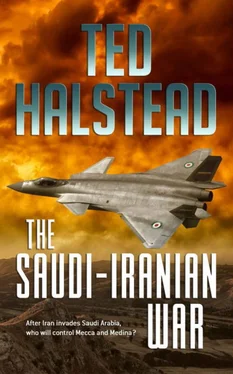Ted Halstead - The Saudi-Iranian War
Здесь есть возможность читать онлайн «Ted Halstead - The Saudi-Iranian War» весь текст электронной книги совершенно бесплатно (целиком полную версию без сокращений). В некоторых случаях можно слушать аудио, скачать через торрент в формате fb2 и присутствует краткое содержание. Год выпуска: 2019, Издательство: Independently published, Жанр: Боевая фантастика, Триллер, на английском языке. Описание произведения, (предисловие) а так же отзывы посетителей доступны на портале библиотеки ЛибКат.
- Название:The Saudi-Iranian War
- Автор:
- Издательство:Independently published
- Жанр:
- Год:2019
- ISBN:нет данных
- Рейтинг книги:4 / 5. Голосов: 1
-
Избранное:Добавить в избранное
- Отзывы:
-
Ваша оценка:
- 80
- 1
- 2
- 3
- 4
- 5
The Saudi-Iranian War: краткое содержание, описание и аннотация
Предлагаем к чтению аннотацию, описание, краткое содержание или предисловие (зависит от того, что написал сам автор книги «The Saudi-Iranian War»). Если вы не нашли необходимую информацию о книге — напишите в комментариях, мы постараемся отыскать её.
The Saudi-Iranian War — читать онлайн бесплатно полную книгу (весь текст) целиком
Ниже представлен текст книги, разбитый по страницам. Система сохранения места последней прочитанной страницы, позволяет с удобством читать онлайн бесплатно книгу «The Saudi-Iranian War», без необходимости каждый раз заново искать на чём Вы остановились. Поставьте закладку, и сможете в любой момент перейти на страницу, на которой закончили чтение.
Интервал:
Закладка:
Ted Halstead
THE SAUDI-IRANIAN WAR
Dedication
To my wife Saadia, for her love and support over more than thirty years.
To my son Adam, for his love and the highest compliment an author can receive — “You wrote this?”
To my daughter Mariam, for her continued love and encouragement.
To my father Frank, for his love and for repeatedly prodding me to finally finish my first book.
To my mother Shirley, for her love and support.
Chapter One
Prince Ali bin Sultan grit his teeth in frustration at the familiar sight. His tank company was too late again, and the missile had already been fired at Riyadh. Though the missile attacks were a response to Saudi Arabia’s intervention in Yemen’s civil war, now they were a principle reason for the growing number of Saudi troops in Yemen. The possibility that if the Saudis left Yemen the attacks might stop genuinely never occurred to Ali, or for that matter to any other member of the Saudi royal family.
Ali surveyed the ballistic missile launch site from the cupola of his M1A2 tank, identical to all of the other eleven tanks in the company deployed for this mission. He spotted smoke that was still rising from some of the debris ignited by the back blast from the missile’s launch, and smiled grimly. They were getting closer.
Technicians were already scrambling across the site collecting samples of debris and fuel. Part of Ali knew that it was important to determine whether the missile had been a Burkan-2H, a Qiam 1, a Shahab-2, or a missile the Houthi rebels had never used before. From the size of the blast crater the missile left when it was fired Ali suspected it was a missile larger than the ones the Houthis had used so far.
A much bigger part ached to be able to attack the country supplying the Houthis — Iran.
Iran had always denied supplying the Houthis with missiles. Of course, it had never been able to explain the missile debris with Farsi characters stenciled into the metal found in both Yemeni launch sites and targets in Saudi Arabia. Farsi, a language spoken almost exclusively in Iran. Or suggested an alternative source of missiles for the Houthis, who certainly weren’t capable of manufacturing the missiles themselves.
Ali had made the case to his superiors that they either needed to send more troops and armor to Yemen, or radically change their tactics. He had argued repeatedly that tanks should be sent out in platoon strength, not company. Ali knew that one reason for sending out tanks a dozen at a time was fear of having a prince killed or — even worse — captured. He had offered to give up his command if it meant a smaller, quicker force would be deployed to reported launch sites.
The answer had still been no, because there was no appetite for the political consequences of Saudi casualties in any significant number.
Especially since the missile attacks had been largely ineffective thanks to American-supplied Patriot missile interceptors and the poor accuracy of the missiles. So far.
Ali had also argued for greater focus on the missiles by the Royal Saudi Air Force (RSAF). Unfortunately, those assets were controlled by another prince, with his own ambitions. RSAF Commander Prince Khaled bin Fahd believed the Houthis needed to be attacked wherever they were to be found, and that if they could just kill them all there would be no one left to fire the missiles. So, while he would sometimes act on missile site reports, if he had alternative targets to attack with more reported Houthis, that’s where his planes would go.
As often as not, either the intelligence reports Khaled acted on were faulty or dated, or his pilots missed their target. The civilian death toll that resulted was becoming a real problem. Not because Ali, Khaled or anyone else in the Saudi royal family was concerned about Yemeni civilian deaths.
Instead, it was because though the Americans had sold the Saudis all the weapons and ammo they’d asked for and supplied them with satellite imagery and other intelligence for free, they were unpredictable. Today they were willing to tolerate the criticism from those worried about Yemeni civilian casualties. One election could radically change that, though, and Ali thought only a fool would count on American support indefinitely.
Ali sighed, and climbed down into the tank to use its radio. Time to find out what damage this missile had caused, and whether someone would be willing to change a strategy that had been failing for years.
Grand Ayatollah Reza Fagheh nodded dismissal to the servant who had brought tea for him and his guest, Farhad Mokri. Reza showed every one of his seventy years in his lined face, white hair and beard and stooped shoulders, but a sharp intelligence still glittered in his dark eyes. By contrast, Farhad with his slim frame, thick black hair and erect posture looked like the university student he had been until recently, and was only twenty-six.
They were meeting in the Assembly of Experts Secretariat building in the holy city of Qom, about a two-hour drive south of Tehran. Reza was Deputy Chairman of the Assembly of Experts, which both chose Iran’s Supreme Leader and advised him once chosen.
Reza was a candidate for Supreme Leader, and was now acting in that position due to the current Supreme Leader’s terminal illness. All the doctors could say was that there was no cure, he could die any day, and was unlikely to emerge from his coma before he did. Until he actually died, Reza had the acting Supreme Leader title.
Reza knew, though, that he had to tread carefully. The Assembly expected him to act solely as a caretaker until a new Supreme Leader was chosen, and any new initiatives could hurt his chances in the upcoming selection by his fellow clerics if they became known prematurely.
Reza knew those chances were slim, and that he would probably be passed over for a man he despised, who despite his denials Reza was certain would lead Iran down a new and dangerous path of reconciliation with the West. It was a path that could even lead to the end of control by Iran’s religious leaders.
That could never be allowed.
Reza had decided on a risky gamble that would either see him selected as Supreme Leader, or executed for treason. With Iran’s future at stake, and at his age only a handful of years left in any case, courage was not hard to find.
“So, Farhad, tell me about the progress you have made since we last met,” Reza said, in a tone that made it plain he expected a positive answer.
He was not disappointed.
“I have made contact with one of the surviving Saudi resistance organizations. I was fortunate in being able to reach a Saudi I knew from my student days in the United States. His father was an outspoken critic of the government who simply disappeared while my friend was still a child. I know him well enough to be sure he is not a Saudi government plant, even without that history. The best part is that since we know each other well, I believe it will be relatively easy to obtain his organization’s participation in our plan — while making him believe it was his idea.”
Reza nodded. “Excellent. So, he knows of your uncle’s leading role in our nuclear weapons program?”
Farhad smiled. “Indeed he does.”
Reza pursued his lips. “I see you used some of the funds I provided to set up an online presence for the organization that will be the initial facade for our attack. Why did you decide on Al-Nahda for its name?”
Farhad shrugged. “Well, it was obvious that the name should be Arabic rather than Farsi, which would have pointed straight at us.”
Читать дальшеИнтервал:
Закладка:
Похожие книги на «The Saudi-Iranian War»
Представляем Вашему вниманию похожие книги на «The Saudi-Iranian War» списком для выбора. Мы отобрали схожую по названию и смыслу литературу в надежде предоставить читателям больше вариантов отыскать новые, интересные, ещё непрочитанные произведения.
Обсуждение, отзывы о книге «The Saudi-Iranian War» и просто собственные мнения читателей. Оставьте ваши комментарии, напишите, что Вы думаете о произведении, его смысле или главных героях. Укажите что конкретно понравилось, а что нет, и почему Вы так считаете.












